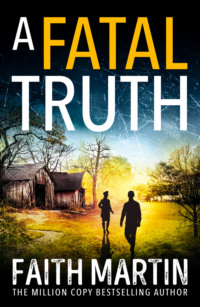
Полная версия
‘That sounds rather cruel,’ Trudy felt compelled to say.
‘Oh, it was. But then, in a way, it wasn’t,’ Mary said, rather enigmatically. ‘I mean, I don’t think Gisela did it to be deliberately cruel – I think she just didn’t understand it was cruel. Do you see the difference?’
Trudy smiled. ‘She didn’t set out to hurt her brother, it was just that she didn’t care if she did.’
But again, Mary was inclined to remain loyal to her dead friend. ‘Not quite. With Gisela, the only thing that mattered was how she felt. How her life was going. How she could entertain herself. Oh, I’m not explaining this very well!’ Mary said, cross with herself. ‘Gisela was the sort of girl who always had to be feeling things. To her, life wasn’t really being lived unless something was happening. She loved rows and arguments because she could become heated and indulge in clever language, and fire things up. She loved melancholy, and feeling sad, because at least then she knew she was alive. That’s why she kept that diary of hers. She was always writing in it, dramatising herself and what was happening to her. She’d spend hours writing in it, as if she expected somebody to publish it one day! She never let us read it, of course, but I suspect it was pretty sensational.’
Trudy nodded. ‘Gisela saw herself as a heroine in a novel?’ But as she spoke, she wondered: where was this diary of Gisela’s now? She was sure she’d seen no mention of it in the case files.
‘Yes. Exactly.’ Mary beamed. ‘And most of all, of course, Gisela loved being in love. And that was why that thing with Jonathan McGillicuddy really threw her for a loop, because, for the first time, I think it was the real thing. And not just one of her fantasies or self-indulgences.’
‘Ah,’ Clement said, nodding his head. ‘Gisela actually fell in love, instead of just playing at it.’
‘Yes. With Jonathan it was different. That’s why it really broke her up – and for real, I mean, not pretend. It shocked her to the core when he left her,’ Mary said sadly. ‘I don’t think it had ever occurred to her that any man could leave her.’
Trudy made a brief note in her notebook. Here again was independent confirmation that Jonathan had been the one to break off the relationship, not Gisela, as the dead girl had tried to insist.
‘Did you know Jonathan well?’ Trudy asked. Mindful as she was that the coroner’s interest lay in getting to the truth about the Fleet-Wright case, she knew DI Jennings expected her to keep the McGillicuddy murder and Deering case at the forefront of her investigations.
And she was determined to prove to her boss that she was reliable.
‘Not really. I knew him because he was Gisela’s boyfriend, but we didn’t get to meet him that often. Her friends, I mean. Gisela kept him guarded as if he was treasure. She wanted to make sure none of us stole him from her.’
‘She was possessive then?’
‘Very!’ Mary confirmed wryly.
‘What did you make of Jonathan?’ she asked next.
‘Oh, he was a bit of a catch, I suppose. Even though he was only her parents’ gardener, he was really good-looking and just that bit older than us, which made him intriguing! And the fact that he was a widower with a young daughter just made him even more glamorous.’
‘Did he seem to have any enemies?’
‘No,’ Mary said, her normally cheerful and open face looking openly dismayed now. ‘I read about his murder in the paper. It’s terrible! I hope you catch who did it.’
‘We will,’ Trudy said grimly, earning her a sharp, not entirely approving look from her companion. While she knew the police didn’t always solve their cases, and that she shouldn’t really throw out promises so rashly, she didn’t care. Let the old vulture be cynical – she could just feel it in her bones that they were going to catch the poison-pen killer of Jonathan McGillicuddy. ‘So, when you knew him, you weren’t aware of any problems he might have had?’ she pressed on.
‘Problems?’
‘Drinking, gambling, running around with a bad crowd?’
‘Oh, no. Nothing like that,’ Mary said.
Trudy sighed but nodded. It was as she’d always thought. Jonathan had died because he’d been Marcus Deering’s son, and some madman had a grudge against Deering. And with Jonathan being the illegitimate, secret, unprotected and unsuspecting son, he had presented a far easier initial target than the much more cosseted – and beloved – Anthony.
Still, she’d had to ask.
Ten minutes later they left the little cottage and headed back to Oxford. ‘It’s looking more and more likely that it was suicide, isn’t it?’ Trudy said, as Clement tried – and failed – to overtake a trundling tractor that was blocking two-thirds of the narrow country road ahead of them.
But it was as if the older man hadn’t heard her. ‘I want you to go and talk to former PC Richard Gordon,’ he said out of the blue, then gave his horn an impatient blast.
Ahead, the tractor made no obvious signs of moving over to accommodate him.
Trudy instantly recognised the name. ‘The PC who was first on the scene when the doctor called in the police? Why?’ she demanded. ‘As the local beat officer he’d have been asked to make an initial assessment and then report back, but it would have been the officer who then took over the case – DI Harnsworth – who’d have the best handle on it.’ Unfortunately, they wouldn’t be able to talk to Harnsworth, as he’d died shortly after retiring from the force last year.
‘Humph!’ Clement grunted then blasted on the horn again. In front, the tractor trundled placidly on down the middle of the road.
‘I tried to talk to Gordon right after the inquest,’ Clement admitted reluctantly. ‘He wasn’t helpful. He seemed to think I was questioning his competence. Clearly, members of your profession have fragile egos,’ he stated flatly.
Which, coming from the old vulture, Trudy thought with a catch in her breath, was truly an example of the pot calling the kettle black!
‘Which is why I want you to talk to former PC Gordon on your own and without me. Perhaps he’ll be less prickly with one of his own.’
But Trudy (apart from being much entertained by thoughts of how the ego-laden coroner had been put in his place by a lowly constable) wasn’t so sanguine about this. As a young probationary WPC, she doubted very much that the retired Richard Gordon would think of her so much as ‘one of his own’ as someone who had no right to be wearing the uniform in the first place.
Which was what everyone else at the station thought as well, with the possible exception of Sergeant O’Grady and maybe the old desk sergeant, who seemed to like her.
Not that she’d let any of that stop her!
Her chin came up as she said evenly, ‘I’d be happy to talk to Mr Gordon.’
Clement Ryder turned his angry eyes away from the stubborn tractor driver in front to give her a thoughtful look. And noting the determined thrust of her chin, his lips twitched.
‘Thank you, Constable Loveday,’ he said mildly.
CHAPTER NINETEEN
The editor of the Oxford Mail was intrigued and a little puzzled by the piece submitted by Sir Marcus Deering for inclusion in the next issue of the paper. But, like the good newspaper man he was, he scented a story in it somewhere, which was one of the reasons he’d agreed to include it. It was hardly breaking news, but Sir Marcus was a rich and powerful man, and his department store in the city centre paid well to be a regular feature in their advertising section – which was always something to keep in mind.
That, and the fact that Sir Marcus regularly dined with the newspaper’s owner.
There was also that little matter of his son’s recent minor car accident, which had barely merited a line or two on the bottom of page nine. Now he wondered about that. Could there be a connection?
And so the piece, outlining the great man’s humble beginnings in business, and his angst, regret and horror over a warehouse fire that had happened when he’d been employed in one of his first positions, ran on page five, with a nice little publicity shot of the entrepreneur himself. Along with the mention that he’d just donated five hundred pounds to a local orphanage.
And, apart from a mental note to himself to ‘watch this space’, the editor thought no more about it.
Trudy found the Gordon family residence easily enough. Situated in Kidlington, on the leafy outskirts, where the Oxford canal ran close to the railway line, the now-retired PC Richard Gordon lived with his wife, Glenda, and the youngest of his five children, who had yet to marry and move away.
But there was no sign of either the remaining chick or his wife when her erstwhile colleague opened the door, made a show of checking her credentials, and somewhat reluctantly led her through to a small living area.
Off on one side, she could just see through the window a glassed-in extension that his wife would probably call an orangery, where several rather sick-looking plants struggled against the cold of the January day and the minimal hours of daylight.
‘You’re lucky to catch me in. I work three nights a week as a night watchman, so I’m often in bed this time of day. So, what’s all this about?’ Gordon asked her flatly.
At sixty-one, he was a heavy man, rapidly going bald, and had a pair of rather boiled-gooseberry blue eyes. A large nose did little to enhance his looks, and red-veined cheeks told Trudy he was probably partial to the booze too. Nicotine-stained fingers plucked aside one of the curtains as he peered outside, perhaps to see what his neighbours thought of this visit by a uniformed police officer.
Which was odd, surely, Trudy thought, for a man who’d once worn the uniform himself? What did he have to be ashamed of?
But when Trudy looked out into the lane beyond, she noted that, like the Gordon residence itself, the houses here were all rather nice. Modestly detached, with several showing the recent additions of garages, extensions and the odd conservatory or two, there wasn’t a council house in sight.
‘Well, Constable?’ Richard Gordon barked, and Trudy knew she was blushing again, having been caught letting her mind drift.
‘Sorry, sir, I haven’t been on the job that long,’ she said smartly, trying to play the little-lost-lamb card. She’d found it amazing how much she could learn, from middle-aged men especially, if she acted like a poor, helpless female in need of male help. ‘I expect, in your day, a man with your experience would have got down to the nitty-gritty already,’ she added, figuring it wouldn’t hurt to stroke his ego a little either. Another lesson she’d long since learned was that it was almost impossible to flatter a man too much. ‘It’s about an old case of yours, sir,’ she added.
Of course, that was stretching it a bit. The Fleet-Wright case had never been ‘his’. As a lowly beat constable, his sole role had been to respond to the original call, assess it, and report back as to what the situation warranted. Once he’d left the Fleet-Wright residence after that, he’d played no further part in the case – except to give evidence at the inquest.
‘Well, sit down then,’ Richard said a shade impatiently, indicating the armchair of a rather nice three-piece suite in beige rayon. Instantly, she wondered how much it had cost, and quickly darted her eyes around the room, taking in the rather swanky lampshade in one corner, and the sheepskin rug in front of the gas fireplace.
‘Thank you, sir.’ She beamed at him, hoping she wasn’t overdoing it. ‘You may have read in the papers about the murder of a man called Jonathan McGillicuddy?’
Richard shot her a sharp look. ‘You’re not on that are you, Constable? You look young enough to still be in your probationary period!’
‘Oh no, sir. I’m not on the murder case, I mean,’ Trudy said hastily. ‘I wish! No, sir, I’ve been seconded to the coroner’s office to help the current coroner with an old case. Gisela Fleet-Wright?’
Instantly, she saw the older man stiffen, and his expression, which had ranged from condescending to vaguely amused as she chattered and gushed, now went curiously blank. A moment later, however, he was frowning and making a good show of a man trying to cast his mind back. But Trudy wasn’t deceived. She would willingly have bet a month’s wages that this man remembered the case perfectly well.
And again, she felt a growing sense of excitement. Was it possible that the old vulture really was on to something significant and important, after all?
‘Not sure I recall the name,’ the former PC said vaguely.
‘A young girl, sir. Found dead in bed. The coroner’s verdict returned death by misadventure. She’d accidentally taken too many pills?’
‘Oh, yes. Yes, of course, now I remember. Shame. A pretty girl. Young too. Yes, her mother called the doctor, and the doctor called us in.’
‘That’s right,’ Trudy said brightly. ‘What can you remember about that case, sir?’
Richard, who had sat down on the sofa, now laid his arms across the back of it and shrugged. ‘Not much.’ On the coffee table in front of him lay an issue of that morning’s Oxford Mail, opened at the crossword puzzle. Trudy knew it also carried the piece Marcus Deering had had put in, after DI Jennings had sanctioned it.
The thinking on that was clear enough, she supposed. Obviously the killer was looking for some kind of sign of remorse on the part of the businessman, and the piece in the paper was meant to appease him. She truly hoped it would work, but somehow didn’t think it would.
Anthony Deering was recovering in hospital, having only sustained some minor wounds in the car crash. Luckily, he’d managed to slow down the big car he’d been driving sufficiently enough to prevent real injuries. But it hadn’t taken the police mechanics long to ascertain the man’s brakes had been interfered with in a deliberate act of sabotage.
‘It was a sunny day when you found her, I believe, sir?’ Trudy prompted, since it was clear that former PC Gordon was in no mood to be helpful and wasn’t about to volunteer information.
‘Yes, that’s right. She was lying on the bed looking as if she was asleep. The windows were open, I remember. And the gardens were lovely. I remember thinking that when I first answered the call.’
Of course, McGillicuddy would have worked on those gardens too, in the early days of his courtship with the daughter of the household. Trudy felt a pang of sadness as she acknowledged he’d never be able to plant another flower or shrub again. Briefly, she thought of his poor mother, sitting alone in her quiet house.
‘You were on the beat?’ She forced herself to keep her mind on the job at hand. Both Sergeant O’Grady and Rodney Broadstairs had told her off in the past for empathising too much with the victims and not concentrating on her police work.
Grimly she told herself to damn well toughen up.
‘Yes. I’d just checked in, actually. That’s why the desk sergeant, who knew where I was, asked me to look into it. I wasn’t more than five hundred yards away when the attending doctor called it in.’
Trudy nodded. Sometimes you just happened to be in the right place at the right time.
‘So what’s this got to do with the McGillicuddy case?’ Richard suddenly demanded, and for a moment Trudy looked at him blankly as he scowled back at her. ‘When I first asked you what this was all about, you mentioned the recent murder,’ he reminded her.
Trudy flushed again, this time genuinely feeling stupid for having forgotten that. ‘Oh, yes, sir. Well, Mr McGillicuddy was a former boyfriend of Gisela Fleet-Wright. There was some speculation that her recent breakup with him might have led to her death.’
‘But it didn’t, did it?’ Richard snorted impatiently. ‘Didn’t the mother put her hands up for it? Something about her daughter not taking her medication, so she accidentally gave her too much or something?’
‘Yes, sir. You followed the case then?’ Trudy said blandly.
‘’Course I did. I found the poor girl, didn’t I?’ The older man bristled. ‘Something sad, like that. You take an interest.’
Trudy nodded. She supposed that could be true enough, so why didn’t she believe him?
She was aware she’d taken an instant dislike to her former colleague, but she wasn’t letting that affect her judgement. No, it was something else that was bothering her about all this. She was sure the man was prevaricating, if not downright lying to her.
At that moment, however, the front door opened and a woman’s voice called through. ‘Hello, Dickie, I’m home. I got some steak and kidney for… Oh, sorry, I didn’t realise…’
Glenda Gordon was a few years younger than her husband, and probably several stones heavier, with a round, pleasant face, a mass of dyed-brown curls and big hazel eyes. She looked at Trudy uncertainly, taking in her uniform and shooting her husband a quick, questioning and – yes, Trudy was sure of it – distinctly anxious look.
‘This is WPC Loveday, Glen,’ Richard said, very casually. ‘She’s just asking me for some help with an old case of mine. Nothing to worry about. Why don’t you pop the kettle on.’ He got up. ‘The constable was just leaving anyway.’
Was I? Trudy thought grimly. But a quick glance at the shuttered, unhelpful face of the older man told her it would be pointless pressing him any further now. She knew that look, having seen it on perpetrators’ faces before, and it told her he would only dig his heels in and become even more stubbornly unhelpful if she pushed him.
‘Yes, thank you, sir.’ Trudy forced herself to smile. But as she passed Glenda, she saw that the woman was biting her lip – a sure sign she was worried about something.
The house behind her remained eerily quiet as she made her way through the small hall and out to the front door, and she knew the married couple were waiting for her to leave before they started talking to one another.
How she wished she could be a fly on the wall when they did!
All the way back to the station, as Trudy sat swaying on the bus, she tried to figure out what it was that was bothering her about the whole interview. It was more than just the fact that former PC Richard Gordon had been less than honest. She simply couldn’t shake the feeling that something obvious was staring her in the face that she’d yet to see.
She knew she still had a lot to learn, and sometimes her inexperience annoyed and worried her. Worse, it could sometimes make her second-guess herself.
It wasn’t until she was walking down St Ebbes that it finally struck her. How did a constable with five kids end up retiring early and living in a nice little detached house in upmarket Kidlington?
The killer of Jonathan McGillicuddy read that morning’s article in the Oxford Mail by Sir Marcus Deering with a great deal of interest.
And a thin, rather sardonic little smile.
CHAPTER TWENTY
‘The boss wants to see you,’ Phil Monroe, the desk sergeant, said the moment she stepped into the station house, and Trudy gave a tight little nod.
Was she in trouble? It wasn’t often the DI actually deigned to notice her, let alone actively seek her out, and her first instinct was to cast her mind around for some misdemeanour she might have committed.
‘Don’t worry,’ said Phil, grinning at her, reading her mind easily. ‘He didn’t sound like he was out after blood.’ Two years off retirement, he had a granddaughter Trudy’s age and often gave her encouragement where he could.
‘That’s a relief!’ Trudy gave a brief smile. She half-turned to go, but Monroe was anxious to get the gen on the latest station-house gossip. Which, as everyone knew and accepted, was one of the main prerogatives of a desk sergeant.
‘I hear the DI has thrown you to the wolves then? Or, in this case, the vultures?’ he said slyly.
Trudy gave a wry grin. ‘If you mean our esteemed coroner, then yes. I’m helping him out with an old case.’
‘Bit of a tartar, our Dr Ryder,’ the desk sergeant said. ‘Bloody brilliant chap, mind you. Nothing gets past him.’
‘No. I think that’s why DI Jennings consented to let me help him. He’s worried he might be on to something,’ Trudy admitted. ‘And you know something?’ She leaned forward a little and lowered her voice. ‘I wouldn’t be surprised if he isn’t.’
‘Ah,’ Phil said appreciatively, nodding eagerly. Here was juicy gossip indeed. ‘What you working on then? An unsolved murder?’
‘I wish!’ Trudy said, frowning. ‘The original coroner’s verdict was death by misadventure. A young girl took too many pills. I think the old vult—I mean, Dr Ryder, suspects it was really suicide.’
The desk sergeant nodded, looking a little impressed now. ‘Nasty, that. Suicides – especially when it’s a youngster.’
Trudy nodded. ‘I agree. And I don’t really see why, even if the wrong verdict was given, we should pursue it,’ she muttered. For some time now, she’d felt a pang of conscience over this issue. And since everyone else confided in the desk sergeant – indeed, it was almost a prerequisite that they did – she thought now was as good a time as any to get it off her chest and seek his wisdom.
‘Say Gisela Fleet-Wright did kill herself, and her parents covered it up. Is that so terrible?’ she demanded. ‘I mean, I don’t see what good can come of raking it all up again. It’s not as if her parents haven’t suffered enough, is it? I just don’t see the point.’
‘Hmmm. Fleet-Wright? That name rings a bell,’ the desk sergeant said thoughtfully.
‘Mrs Fleet-Wright confessed at the inquest that she might have been responsible for giving her daughter too many pills. Nothing came of it – I mean, no formal charges were brought against her.’
‘No. That’s not it.’ The desk sergeant shook his head. ‘I remember that case vaguely. But this was something else… something that came across my desk… something minor but… Fleet-Wright…’ He sighed and shook his head. ‘No, can’t think what it was.’ He tapped his temple ruefully. ‘Old memory’s not what it was. But I’ll remember it sooner or later,’ he promised her. ‘Like as not when I’m lying in bed at three o’clock in the morning. Don’t worry, though. When I do, I’ll let you know.’
Trudy thanked him and scuttled off to the DI’s office to see what he wanted. And as she did so, she wondered why she hadn’t, as yet, quite come up with the gumption to ask Dr Clement Ryder outright why he seemed so hellbent on proving Gisela had killed herself.
It wasn’t as if she thought he was a particularly vindictive man.
DI Jennings informed the station house’s only WPC that she would have to do some extra shifts, along with all the other PCs, now they had acquired a prime suspect in the Marcus Deering/McGillicuddy case.
This was the first Trudy had heard of it, and she listened intently as her senior officer briefly filled her in.
Apparently, a victim of the warehouse fire had settled locally, finding work as a gamekeeper. When pulled in for questioning, he hadn’t satisfied Jennings at all on the issue of whether or not he held Deering, or the company he’d once worked for, responsible for his injuries.
‘He had motive, and clearly, living in the area, opportunity. As for means – anyone could have picked up that spade and bashed Jonathan over the head. And most men have some basic working knowledge of cars – certainly enough to half-file through a brake line. So we’re going to be keeping a close watch on him from now on. And if he goes anywhere near the Deering estate, we’ll nab him. Which means round-the-clock surveillance. That means extra shifts and all hands on deck. Including you, WPC Loveday.’
‘Yes, sir,’ Trudy said happily. She’d never been detailed to observation duty before, and was looking forward to it. And adding another skill to her repertoire never hurt. Although the DI then proceeded to warn her that surveillance involved long, boring hours watching a suspect or a suspect’s residence, often while sitting in a cold car or some other equally cold spot, Trudy didn’t care.







